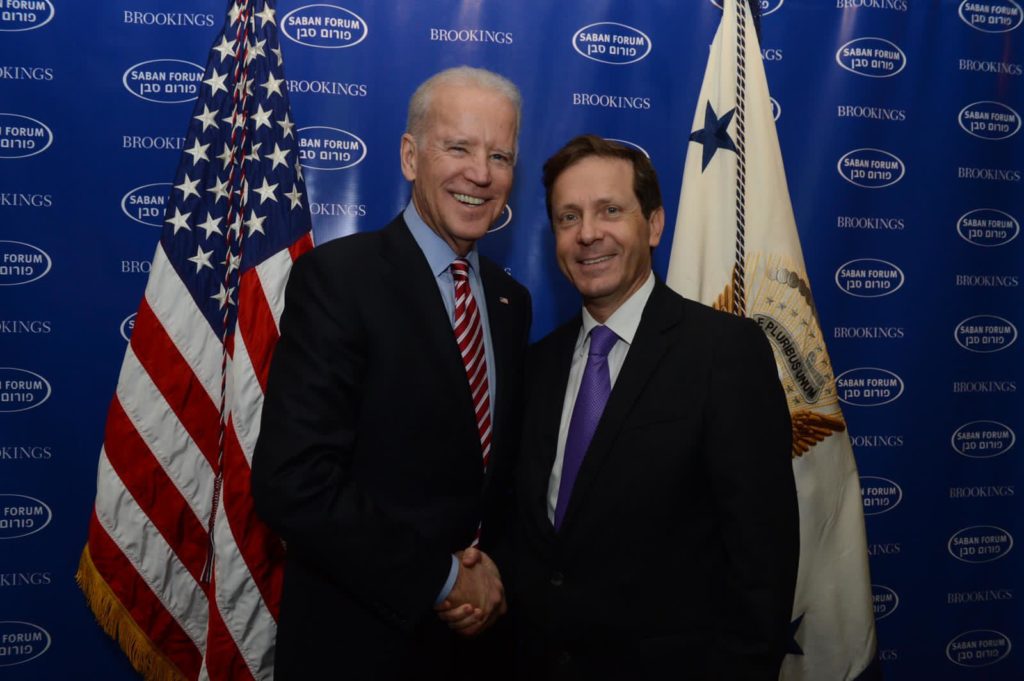
Michael Jacobs, June 4, 2021
Isaac “Bougie” Herzog’s election as Israel’s 11th president on June 2 was such “big” news that it was all but impossible to find on the home page of The Times of Israel a day later. That’s because reporting on a largely ceremonial position was overwhelmed by the end of a two-year wait for the monumental announcement of an eight-party government coalition, including Islamist Arabs and religious Zionist Jews, to unseat the longest-serving prime minister in Israel’s history.
Nonetheless, Israel’s presidency is not entirely ceremonial. When Herzog takes office July 9, he will bring a rare mix of experience and influence with the potential to make dramatic improvements to Israel’s relationship with the Diaspora.
“The president can set the tone and create the atmosphere among the people of Israel as well as of the entire Jewish people,” Barukh Binah, a retired Israeli ambassador with extensive diplomatic experience in the United States, wrote for The Times of Israel in endorsing Herzog’s candidacy for his potential to tighten Israel-Diaspora ties.
Along with world leaders (such as Joe Biden and Vladimir Putin) and Jewish organizations (such as the Jewish Federations of North America, American Jewish Committee and Israeli-American Council), current President Reuven Rivlin welcomed Herzog’s election, tweeting: “Dear Bougie — guarding the character of the State of #Israel is a heavy responsibility. I have no doubt that you will carry it superbly. I will be proud to pass it on to you. Long live the State of Israel! Long live the President of the State of Israel!”
Modern Israel has no royal family, but Tel Aviv native Herzog comes close to Ashkenazi political royalty. His paternal grandfather, Yitzhak HaLevi Herzog, was the chief rabbi of Ireland before becoming the first chief Ashkenazi rabbi of Israel. Abba Eban, possibly Israel’s most famous diplomat, was one of his uncles. His Egyptian-born mother, Aura, was a trained diplomat and military intelligence officer (setting a path her son followed to Unit 8200) who served in several government roles and founded and ran the environmental nonprofit organization Council for a Beautiful Israel. His Irish-born father, Labor politician Chaim Herzog, ran military intelligence for the Israel Defense Forces, was ambassador to the United Nations when he decried the infamous 1975 U.N. resolution equating Zionism with racism, then served two terms as Israel’s sixth president from 1983 to 1993.
Isaac Herzog thus becomes the first son of an Israeli president to be elected president. Having headed the Labor Party from 2013 to 2017, he joins Shimon Peres as the only former political party leaders to win the presidency. In the 2015 Knesset election, Herzog led the Labor-Hatnua combination known as the Zionist Union in an unsuccessful effort to unseat Benjamin Netanyahu as prime minister.
With such political connections, it’s not surprising that Herzog set a record by receiving 87 votes from the 120-member Knesset. It perhaps didn’t hurt that his sole opponent was Miriam Peretz, who did not have Herzog’s extensive political résumé.
But the 60-year-old Herzog’s pre-politics background and his post-Knesset work are what raise hopes for Israel-Diaspora relations during his seven-year term after Rivlin has spent much of his term seeking a degree of unity for politically fractured Israel itself.
With the possible exception of his father, Herzog knows the U.S. Jewish community better than any former Israeli president. While his father was Israel’s ambassador to the United Nations, Herzog lived in New York and attended a Modern Orthodox day school, the Ramaz School. He later studied at Cornell University and New York University.
As the Labor leader, he supported positions more in line with centrist American views about Israeli matters and has developed strong ties with American political leaders.

After the support of American Jewish federations and less Orthodox religious movements helped him win election as the chairman of the Jewish Agency for Israel in June 2018, succeeding Natan Sharansky, Herzog emphasized to The Times of Israel the importance of bridging the gap between Jews inside and outside Israel.
He noted the diversity of Diaspora and U.S. Jewry and supported programs that helped Israelis understand American Jews’ interests and concerns as well as the reverse. He said, “The Diaspora shows a great deal of frustration and anger over Israel, but that’s because it cares about Israel and wants to be involved and is much more active in the Israeli discourse than ever before.”
As he told Haaretz in August 2018, Herzog believes that both the Diaspora, which in Talmudic terms he likes to call Babylon, and Israel, or Jerusalem for his analogy, contain great intellectual, spiritual and Jewish wealth. “When they are apart and not connected, it’s a disaster for the Jewish people and its future.” His most passionate plea for strong Israel-Diaspora relations may be found in his June 2020 interview with David Harris of American Jewish Committee.
In accepting the presidency June 2, Herzog cited both his life’s work and that of generations of his family to build and protect the State of Israel. He pledged to be the president of all Israelis, to help close gaps in Israeli society, and to build bridges between Israel and the Diaspora.
